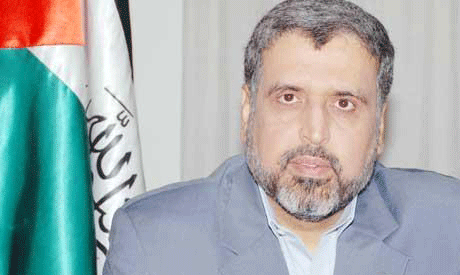 A delegation from Islamic Jihad, a leading Palestinian Islamist organisation, conducted talks on Tuesday in Cairo with Egyptian General Intelligence officials on reconciliation efforts among various Palestinian factions.
A delegation from Islamic Jihad, a leading Palestinian Islamist organisation, conducted talks on Tuesday in Cairo with Egyptian General Intelligence officials on reconciliation efforts among various Palestinian factions.
Egyptian sources say the talks were productive, with delegations from rival Palestinian factions Fatah and Hamas expected to arrive in Cairo next week to consult with Egyptian mediators.
It is expected that a general conference of all factions will be held in Cairo within a month to announce the completion of reconciliation talks between all three movements.
Relations between Fatah and Hamas, the two leading Palestinian factions, have been strained since the two groups faced off in violent clashes in Gaza in 2005 following Hamas' victory in Palestinian general elections the same year.
Since then, the Islamist Hamas has ruled the Gaza Strip, while Fatah, which is backed by various Arab and Western governments, controlled the occupied West Bank.
Israel has maintained an air-sea-ground siege of the Gaza Strip since 2006 to isolate Hamas.
An optimistic atmosphere is prevailing over the current discussions in Cairo, especially in light of the call made last week by Egypt's President Abdel-Fattah El-Sisi for Palestinian reconciliation.
El-Sisi addressed Israeli and Palestinian leaders, stressing that peace, prosperity and cooperation would only take place if both parties are able to reach a two-state solution. The address was welcomed by Israel, Fatah and Hamas.
Although Cairo received Hamas officials in March to discuss the security situation on both sides of Egypt's border with Gaza, the talks had not been renewed.
Egyptian officials had accused the Palestinian movement of not implementing recently agreed upon security arrangements along the border.
However, Hamas maintained that it is honoring its commitments to Cairo, saying it arrested a few days ago four individuals attempting to smuggle items through border tunnels Egypt deems both illegal and dangerous to its security.
Sources in Cairo, however, said that the relationship was not "warm" between the two parties.
Cairo has upgraded its relationships with the Islamic Jihad movement, a competitor of Hamas, since the Israeli assault on the Gaza Strip in 2014.
Cairo mediated a ceasefire at the time between Israel and the Palestinians through direct talks with Jihad, and not Hamas.
Egypt has deemed Hamas dodgy in its intentions and modus operandi, especially after the ouster of Hamas' ally the Muslim Brotherhood from power in Egypt in 2013.
Moreover, Cairo has accused Hamas of interfering in internal Egyptian politics and aiding Islamist militants fighting the government in North Sinai. Hamas has repeatedly denied such accusations.
However, Mohamed Gomaa, an expert in Palestinian affairs at the Ahram Centre for Strategic Studies, told Ahram Online that Cairo has aspirations to see a genuine Palestinian reconciliation.
Gomaa added that the most powerful indication of this wish was El-Sisi's recent call for peace.
However, Gomaa believes several hurdles remain to achieving this reconciliation, including whether Hamas has actually changed its previous rigid positions and is now interested in real solutions.
"This has not taken place yet," Gomaa says.
Gomaa explained that Hamas might view Cairo-Jihad direct talks as a threat to its monopoly on power in Gaza.
Gomaa added that the outcome of reconciliation efforts remains unknown, especially since the current balance of power on the Palestinian front does not oblige Hamas to make any fundamental changes in its stances.



